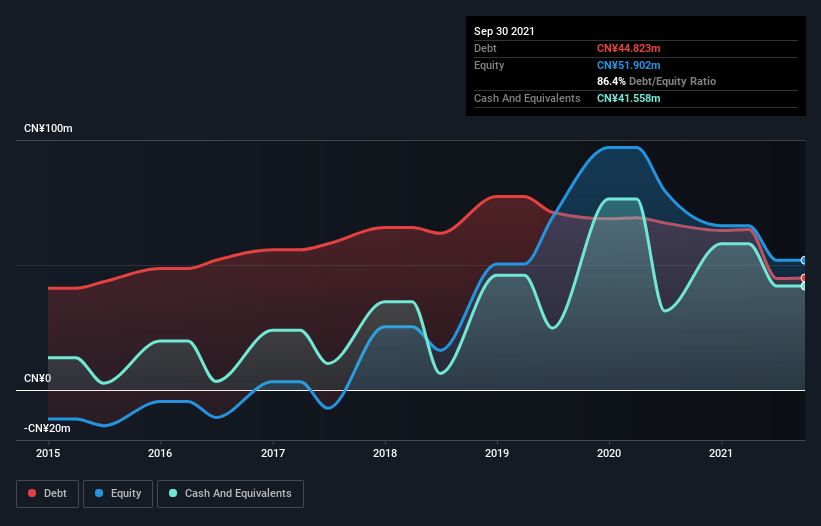Here's Why Sing Lee Software (Group) (HKG:8076) Can Afford Some Debt
Howard Marks put it nicely when he said that, rather than worrying about share price volatility, 'The possibility of permanent loss is the risk I worry about... and every practical investor I know worries about.' So it might be obvious that you need to consider debt, when you think about how risky any given stock is, because too much debt can sink a company. We can see that Sing Lee Software (Group) Limited (HKG:8076) does use debt in its business. But should shareholders be worried about its use of debt?
When Is Debt A Problem?
Debt assists a business until the business has trouble paying it off, either with new capital or with free cash flow. If things get really bad, the lenders can take control of the business. However, a more usual (but still expensive) situation is where a company must dilute shareholders at a cheap share price simply to get debt under control. Having said that, the most common situation is where a company manages its debt reasonably well - and to its own advantage. The first step when considering a company's debt levels is to consider its cash and debt together.
See our latest analysis for Sing Lee Software (Group)
How Much Debt Does Sing Lee Software (Group) Carry?
You can click the graphic below for the historical numbers, but it shows that Sing Lee Software (Group) had CN¥44.8m of debt in June 2021, down from CN¥66.9m, one year before. However, it does have CN¥41.6m in cash offsetting this, leading to net debt of about CN¥3.27m.

A Look At Sing Lee Software (Group)'s Liabilities
The latest balance sheet data shows that Sing Lee Software (Group) had liabilities of CN¥36.9m due within a year, and liabilities of CN¥23.0m falling due after that. Offsetting this, it had CN¥41.6m in cash and CN¥43.9m in receivables that were due within 12 months. So it actually has CN¥25.5m more liquid assets than total liabilities.
This excess liquidity is a great indication that Sing Lee Software (Group)'s balance sheet is almost as strong as Fort Knox. Having regard to this fact, we think its balance sheet is as strong as an ox. There's no doubt that we learn most about debt from the balance sheet. But you can't view debt in total isolation; since Sing Lee Software (Group) will need earnings to service that debt. So when considering debt, it's definitely worth looking at the earnings trend. Click here for an interactive snapshot.
In the last year Sing Lee Software (Group) had a loss before interest and tax, and actually shrunk its revenue by 22%, to CN¥84m. To be frank that doesn't bode well.
Caveat Emptor
Not only did Sing Lee Software (Group)'s revenue slip over the last twelve months, but it also produced negative earnings before interest and tax (EBIT). Its EBIT loss was a whopping CN¥33m. On a more positive note, the company does have liquid assets, so it has a bit of time to improve its operations before the debt becomes an acute problem. But we'd want to see some positive free cashflow before spending much time on trying to understand the stock. So it seems too risky for our taste. The balance sheet is clearly the area to focus on when you are analysing debt. But ultimately, every company can contain risks that exist outside of the balance sheet. We've identified 3 warning signs with Sing Lee Software (Group) (at least 1 which is concerning) , and understanding them should be part of your investment process.
Of course, if you're the type of investor who prefers buying stocks without the burden of debt, then don't hesitate to discover our exclusive list of net cash growth stocks, today.
New: Manage All Your Stock Portfolios in One Place
We've created the ultimate portfolio companion for stock investors, and it's free.
• Connect an unlimited number of Portfolios and see your total in one currency
• Be alerted to new Warning Signs or Risks via email or mobile
• Track the Fair Value of your stocks
Have feedback on this article? Concerned about the content? Get in touch with us directly. Alternatively, email editorial-team (at) simplywallst.com.
This article by Simply Wall St is general in nature. We provide commentary based on historical data and analyst forecasts only using an unbiased methodology and our articles are not intended to be financial advice. It does not constitute a recommendation to buy or sell any stock, and does not take account of your objectives, or your financial situation. We aim to bring you long-term focused analysis driven by fundamental data. Note that our analysis may not factor in the latest price-sensitive company announcements or qualitative material. Simply Wall St has no position in any stocks mentioned.
About SEHK:8076
Sing Lee Software (Group)
An investment holding company, together with its subsidiaries, engages in development and sale of information and network technologies and services to the financial industry in the People’s Republic of China.
Adequate balance sheet and slightly overvalued.
Market Insights
Community Narratives



